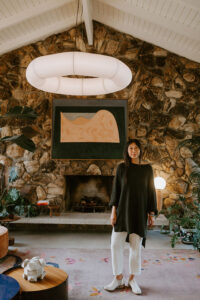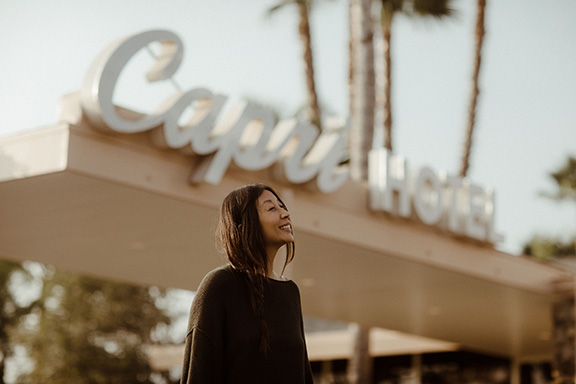

Kenny Osehan | photo by Brandi Crockett
FEATURE | By Robin Gerber
Kenny Osehan & The Shelter Social Club
It’s thousands of miles from Bandung, Indonesia to Santa Barbara via Loma Linda, but that’s the journey Kenny Osehan traveled as a child. Her journey to create Shelter Social Club, a collection of hotels in Ojai and Los Alamos, was also long, not in miles, but in determination, inspiration and grit.
Kenny, tall and lithe with straight black hair past her shoulders, and the grace of a dancer owns the Ojai Rancho Inn, Capri Hotel, Alamo Motel and the Hummingbird Inn, which will be added to her brand once it’s renovated. All the properties reflect two resounding themes in Kenny’s life, artistic spirit and creating community. Both are rooted in family.
Kenny was only eight months old when her parents, Yani and Anthony, brought her and her older sister, Jessy, to join other relatives already in the United States. The family carried a tradition of working hard, and working together. Kenny’s grandmother had eight children, and everyone pitched in to earn money from a young age. In Indonesia they made fruit desserts, and each child sold the delights in the neighborhood, at school or on the street.
In Loma Linda, the work changed, but not the collective effort. Kenny’s parents had a Laundromat. Kenny remembers helping clean, which included the fun of riding around in the laundry carts with her sister. They got treats from the Dairy Queen next door, and often fell asleep in the family car waiting for their parents to close up. Kenny also helped with her mom’s table at swap-meets around the area, at her Aunt’s bakery in Redlands, and by modeling clothes that her mother and aunt made. “They were always working on things together,” Kenny remembers.
“My grandmother lived with us, and I always heard the sewing machine going in the garage.” Kenny’s extended family formed a tight ‘pod’ in today’s parlance. “My parents’ house was where everyone got together.” The family spoke a language called Bahasa Indonesia. Kenny entered kindergarten speaking only her native language, and what English she had learned from cartoons. “I loved Looney Tunes and Sesame Street,” she laughs. On the way to that first day of school, Kenny’s parents gave her another challenge.
They told her American children would make fun of a girl named “Kenny,” so she had to tell everyone her name was “Kennilia.” They came up with it by adding my cousin’s name, Lea, on to my name,” Kenny remembers.
“I was terrified that I’d forget how to say it and spell it, and the other kids would find out what my real name was. I finally changed back to Kenny in high school.”
When Kenny was nine, her parents moved the family from their three-bedroom house in Loma Linda to Santa Barbara. Kenny’s sister had asthma, and they felt the climate would be better for her health.
The Osehans became the managers, and eventual owners, of a thirteen-room budget motel called The Travelers, which is now the Agave. The family lived in a cramped one-bedroom, one bathroom manager’s unit in the motel.
Kenny was devastated by the move. “I was very close to my grandmother,” Kenny says, “and I was sad to leave her. I also wasn’t comfortable in Santa Barbara. I didn’t fit in. There were almost no Asian people, and my friends lived in houses with their own bedrooms.” On Kenny’s first day of school, a boy asked her if she knew Karate. “The Karate Kid was popular then,” Kenny sighs.
Besides running the motel, Kenny’s mom started a clothing line with imports from Indonesia, which meant she took extended trips overseas. Her Dad imported Indonesian food for his extra business. My parents were risk takers, and I learned that from them. I saw that if one thing didn’t work out it was OK. They created other opportunities.”
Kenny and her sister were always part of the family enterprises. Kenny went with her mother to the Fashion District in Los Angeles to sell clothes. She worked the front desk at the hotel from the time she was ten, taking reservations, checking people in, doing laundry, ironing pillowcases and helping clean. “I remember Mrs. Hoffman who lived in the hotel for months,” Kenny says. “She was in her eighties, and I would walk her to the grocery store. She was German and gave me dolls with eyes that opened and closed. I thought the faces were so scary I would turn them to the wall.”
No doubt Mrs. Hoffman had good intentions, but when customers arrived late at night to check in, Kenny had to get out of bed so that more than one family member was at the desk. The Travelers attracted some less than desirable clients, and the Osehan’s learned to be cautious.
Kenny didn’t care for school like her older sister did, but she adored drawing and painting. “I always loved to make art, work with clay, sew, be creative. I wanted to be an artist.” Predictably, her parents didn’t see a prosperous future in art, so Kenny got her degree from UCSB in sociology and art history. But the passion to create is a life force in some people. It won’t be denied by something as flimsy as lack of training, parental dictates or the side-tracks of life. Anyone who walks into one of Kenny’s iconic hotels today can see that an artist is in charge.
When Kenny’s parents were offered a short-term lease on The Presidio motel in downtown Santa Barbara Kenny and her then-husband jumped on the opportunity, and asked to run it. It was Kenny’s first chance to act on some of the dreams that had been forming over her years in the hotel industry.

Osehan’s hotels are known for their compelling design.
The couple moved into the Presidio for the first three years. “We were waking up at 3 a.m.art to check people in, and at first the clientele was kind of shady, on drugs, or transient. The police came often, but we turned that around.”
Borrowing money, the pair started renovating with furniture from IKEA, and the help of some UCSB students.
“We just renovated one room at a time as we got the money,” Kenny remembers. “The UCSB art students did a vinyl sticker installation up a wall in a room for an art show we hosted. We thought it was an inexpensive and unique way to create a fun experience in each room. We had them create different murals in all sixteen rooms.”
Just running the motel wasn’t enough for Kenny. She had always dreamed of having a boutique for clothes and accessories, so she opened The Supply room in the lobby of the motel. “I thought it would be a hobby,” Kenny laughs, “but I was working 8AM to midnight.” She closed the boutique after two years, but she had plenty of other ideas.
Jill of All Trades was Kenny’s outdoor swap-meet for female makers, a craft fair with food and jewelry that she held on the hotel grounds. She also started Deck the Halls, a holiday show where crafts’ people rent motel rooms to show their wares, and the event still happens at the Rancho every year. The rooms become pop-up stores where the vendors can stay over for the weekend. The show also allows shoppers to see the rooms. “The events fulfill me creatively,” Kenny says, “and they allow me to connect with old and new friends. They also serve as a way to keep the locals aware of the properties.”
The Presidio became the kind of place Kenny had envisioned, where she could invite friends with pride. “We changed the energy of the motel, and that changed the clientele.” The motel filled a middle niche for places to stay in Santa Barbara. “It was affordable but also offered an experience,” Kenny says. “I wanted people to feel they were entering a community, and get a sense of being a local when they stayed with us.” There were music and art parties, and a modern sense of style new to Santa Barbara. Friends opened businesses nearby, and they made a map for visitors to follow to the stores. One of those visitors was a travel writer, and soon The Presidio got written up in both Sunset Magazine and The New York Times.
The publicity was a great affirmation of Kenny and her partner’s vision, but a devastating shock soon followed. The Presidio landowners would not renew the lease. After years of work, thousands in renovations, and untold hours in building the motel’s engaging brand, Kenny and her partner had to start over.
That’s when they found The Rancho Inn in Ojai.
Steve Edelson, who owns the Rancho property was happy to give them a twenty-year lease, and they got to work updating furnishings, textiles, and fixtures. They planned events and collaborated with artists to bring the property to life.
Kenny thought about how to meld Ojai’s spiritual side with its reputation as a hideout for Bohemian artists. She realized she was already friends with the artists who could fulfill her vision since she had represented their work in her shop at the Presidio.
As an homage to Beatrice Wood, the new owners enlisted Heather Levine to create the ceramic pendant lights in the lobby, rooms and bar. Each room has a sacred door painting by Carly Jo Carson, and shibori-dyed curtains by Nikki Tsukamoto. Eric Trine created octahedron-shaped metal pedestals for the bar and leather woven chairs on each patio. “I’m so grateful to grow alongside these artists,” Kenny says. “Their work created a portal for me to develop the space. We have launched each other. Rancho wouldn’t be what it is without Heather Levine’s ceramic lights, and they’ve become her main work since she designed them for the property.”
In 2016, after the success of The Rancho, Steve offered the chance to run two more of his properties, the Capri and Hummingbird hotels in Ojai. “My motto is “go with the green light,” Kenny says. Owning a group of hotels, which soon included The Alamo Motel in Los Alamos, seemed the perfect time to create a portfolio. “We call it Shelter Social Club because they provide lodging with a social experience. The culture of the space is so important. It can’t just be a place to stay.”
Today, Kenny is managing the brand herself, and struggling with the massive disruption of the Covid-19 pandemic. She has sharp memories of the week in mid-March when everything started shutting down. “I felt the doom of that weekend. Every phone call and email was a reservation cancellation. I had a migraine.”
Kenny had to furlough staff, but helped them get unemployment. She saw thousands of dollars in refunds piling up. “My credit card batches were negative every day.” Kenny frowns remembering, “I struggled to keep money in my bank account, rushed to cancel automatic payments.” All of her reserve was going into the Capri renovation, which she had to stop. “I had been banking on going into the busy season, and replenishing my accounts.”
The Rancho was able to open as an essential business. Kenny’s manager, Sheila, lives nearby, and was happy to work. They started to get long-term rental requests. People saw Ojai as a good place to isolate. “Rancho became a safe space for people who were stuck with nowhere to go,” Kenny says.
By the end of April, Kenny’s other three hotels were open thanks to federal small business loans created after the pandemic took hold. She’s almost up to fifty-percent occupancy, and Steve, her landlord, has given her a generous break on rent.
The renovated Capri Hotel, Kenny’s take on Italian ‘60s/’70s meets mid-century California is ninety-percent complete, and open for reservations. “All the right people came into the picture as I started working on the Capri.” Kenny says. “Artists like Mattea Perrotta who created all original artwork for the rooms and the lobby painting. Jessica Pell of Manola Studios who worked on the vision, Eny Lee Parker made custom desk lamps and wall sconces. Winston and Ted of Dusk Designs did all the desks and beds, and the travertine and oak front desk. The best part for me is working with my friends and people who inspire me.”
Kenny sees a brighter future ahead. “I feel lucky to have a business in a place like Ojai, where people will always want to visit.
Overseas travel is going to be curtailed for a while, so I’m counting on people road-tripping up the coast.” And if those visitors want more than a place to sleep, the Shelter Social Club properties will be waiting.
ck edit button to change this text.


Leave A Comment